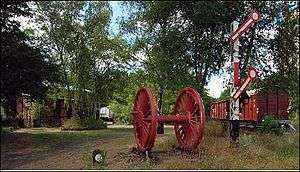AG Märkische Kleinbahn
The AG Märkische Kleinbahn or MKB in Berlin is a German railway museum and heritage railway, founded in 1981, with legal status as a society since 1982. It has set itself the task of preserving historical railway vehicles and other items of railway technology (e.g. signalling equipment, communication and safety equipment) in an operational state or for museum display and to make them accessible to the public. Their centre of operations is the locomotive shed at Schönow.

Vehicles
The MKB's vehicles, sites and special exhibits are maintained voluntarily by members. As far as permission for railway operations is required, the inspections required by law are carried out by the Federal Railway Office (Eisenbahn-Bundesamt).
Operational vehicles which can move under their own power are:
- MKB 01 - Kleinlokomotive Kö 0128, 25 PS diesel engine
- MKB 51 - Rottenkraftwagen ex Klv-51, 75 PS diesel engine
- MKB 52 - Motorised draisine ex Klv-12, 26 PS petrol engine
- MKB 53 - Hand-operated draisine ex TCDD, human powered
- MKB 55 - Motorised draisine ex MÁV, 14 PS petrol engine
In addition there are various goods wagons (some still being refurbished), a Behelfspersonenwagen of Prussian design and a railway post van (stored).
Other exhibits
A ticket office based on a historical prototype, a ticket printing press, the training signal box "Frohnau" and the MKB's 'signal garden' give a glimpse behind the scenes of railway operations.
Operations
The MKB is a co-user of the Zehlendorf Railway in its own right. Rail services, as on other museum railways is not carried out by the MKB, operations are limited to shunting movements. Nevertheless, visitors may ride on the vehicles on the museum site. Each year in September the activities and progress with the society's work are exhibited to the public at an open day.